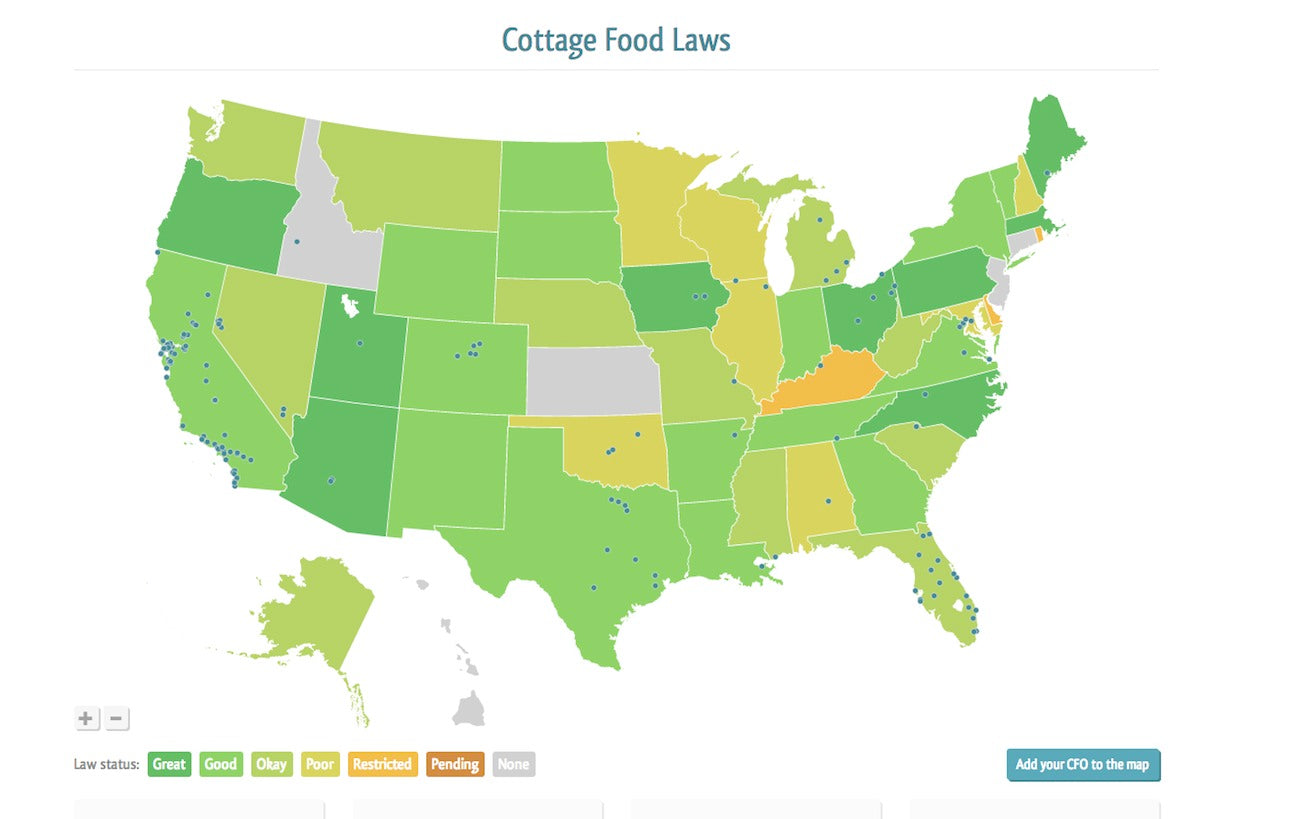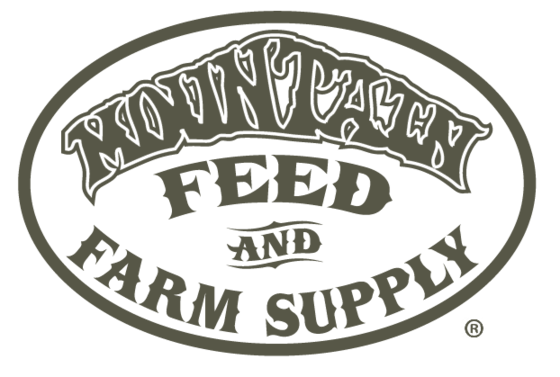- Continue Shopping
- Your Cart is Empty
How to Sell Homemade Food: Start a Home-Based Food Business Under the Cottage Food Bill (AB1616)

To Bake or Not to Bake?
Mark Stambler’s home-baked French breads, a 40-year tradition, won the blue ribbon at the California State Fair in 2006. Pretty impressive right? The day after getting a full-page spread in the L.A. Times for selling his tasty creations, the county health department shut Stambler down because his bread was not being produced in a commercial kitchen.
So Stambler joined the fight to legalize home-based food businesses, and on Jan 1st, 2013 the California Homemade Food Act (AB 1616) was passed into law, also known as the Cottage Food Bill. The bill legalizes home-based food businesses known as Cottage Food Operations, or CFO’s.
Similar bills across the country are enabling homemade food entrepreneurs to sell their creations. The rest of this article details everything you need to know to get started as your own homemade food entrepreneur in California under AB1616. Of course, this is just a start to gathering all the information you need to start your own food business. We recommend doing some reading and giving a call to your States Department of Public Health.
Recommended Books:
Homemade for Sale: How to Set Up and Market a Food Business from Your Home
Kitchen Food Safety: The Science of Keeping Food Safe
Food Safety Manager Certification Exam (FSMCE) Self-Practice Review Questions
Start selling your homemade food now!
Find supplies to package your homemade recipes and sell them to customers.
What Does the Cottage Food Bill Mean to You?
Making a living selling your homemade cookies, breads or other delights sounds like a dream come true right? We sure think so. It was a dream come true for Mark Stambler. With a little bit of research and preparation you can do just that, and we’re here to help.
The Cottage Food Bill gives you the ability to produce and sell “non-potentially hazardous foods” made in your home kitchen. It has opened a new frontier for local food producers to not only make a living doing what they love, but also to contribute to the local food movement and local economies.
Take That Secret Family Recipe to the Market
Under the Cottage Food Bill, you can start a business selling those homemade delights. You could even package Grandmother’s strawberry jam and sell it right next to Smucker’s if you have the right tools and certification! However, like with any law or policy, there are plenty of rules and regulations that come along with the Cottage Food Bill.
Commercial Canning Jars
Here at Mountain Feed, it is part of our mission to provide you with the resources you need to understand the Cottage Food Bill and set yourself up for success as a CFO.
What Does it Take to Start Selling my Jams, Breads or other Non-Hazardous Foods?
There are many valuable resources available for getting started on the right foot with your home-based food business, or CFO. To get the basic facts on the Cottage Food Bill in California, you can visit the Cottage Food Operations overview page from the California Department of Public Health.
The rest of this article pertains to the Cottage Food Bill in California; however, many of the same principles apply for Cottage Food Bills across the nation. You can check out the Cottage Food laws specific to your state here. Here are a few commonly asked questions when starting your home-based food business.
1) Does My Homemade Food Qualify as “Potentially Non-Hazardous”?
The Cottage Food Bill only allows “Non-Potentially Hazardous” foods to be produced and sold from a home kitchen. These foods include breads, jellies, confections and other non-dairy non-meat foods that you can produce safely from your home kitchen and don’t require refrigeration. For the full list of approved foods check out the Approved CA “Non-Potentially Hazardous Foods” List.
2) How Do I Get a Permit? Where Can I Sell my Product?
Cottage Food Operation licenses operate in a two-tiered system.
- With a “Class A” CFO license you can sell directly to consumers from your home kitchen or other venue. Approved venues for direct to consumer sales include farmers markets, online stores, or other similar venues where you interact directly with your customer.
- With a “Class B” CFO license you can sell directly to consumers as well as indirectly through third parties such as restaurants, retail stores and more.
Keep in mind that the Cottage Food Bill only grants you the right to operate in your home state. You cannot sell or ship Cottage Food products across state lines. To see if you meet the requirements for a Cottage Food Operation license, check out the California Permit Requirements for “Class A” and “Class B” Cottage Food Operations.
In order to apply, you must contact your county office and request an application.
Commercial Canning products are different than home canning, one piece lids vs. the traditional lids and band combo
3) Does My Home Kitchen Meet the Standards?
There are different requirements for your home kitchen depending on whether you hold a “Class A” or a “Class B” license. A few of the more general rules that apply to both license types include…
- No pets or children allowed in or around the preparation areas
- No smoking allowed in or around the preparation areas
- You must hold an updated Safe Food Handler’s Card from an accredited organization
“Class B” permits require a more strict set of standards, including a home-inspection from the county health department. There can be other requirements as well, such as…
- Well-water testing if you get your water from a private well
- Private sewage system inspection if you are on private sewage
- Submitting sample labels of your products to the county
- And more depending on your license type
To learn more about the exact health and safety requirements for your home kitchen, check out the official sanitation and preparation requirements for Cottage Food Operations.
4) How Do I Set Up My Business?
Although the Cottage Food Bill has created a huge new opportunity for home-based food businesses, it doesn’t exempt us from the normal required procedures for setting up a small business in CA. Things you’ll need to start a CFO include a seller’s permit, an official business entity, and any standard requirements that other normal small businesses need.
You’ll probably also need some form of food liability insurance. Here’s a provider you can check out to get started. Visit your respective government websites or your local small business resource center to learn more. It’s always good to set things up right from the start.
5) Are There Any Other Resources Out There to Get Me Started?
Fortunately for homesteader’s and foodies like us, the Cottage Food Movement is exploding all over the United States! States are constantly updating and improving their laws.
Moreover, Cottage Food organizations & communities are popping up all over the place, fighting for our right to sell homemade foods and promote local economies.
It’s an exciting time to be a homemade food producer! Here are a couple of places you can go to get solid information…
Forrager.com - Run by Cottage Food activist David Crabill, Forrager.com is a leading website in the Cottage Food community. It offers accurate information and support to Cottage Food Operators around the country. Here are a couple of crucial pages from the site….
- California Cottage Food Bill Overview
- Cottage Food Laws by State
- Cottage Food Frequently Asked Questions
Other Helpful Resources
- California Health Department Cottage Food Operations Resource Page to get the most up to date information from the state.
- An amazing podcast on Cottage Food Operations in CA from Talkrealfood.com
- The Official Cottage Food Bill (AB1616) to check out the original law that Mark Stambler helped to pass.
Remember, always check the applicable laws and policies for your specific State, County and local jurisdictions before selling your homemade foods.
Salsas and bone broth are popular cottage foods sold in sizes from 9-16 ounce commercial canning jars. Commercial canning jars work differently from home canning jars and can be canned using the water bath canning method.
Over to You
It’s part of our mission here at Mountain Feed to help you make delicious, sustainable, homemade food more often. Stop by and say hello on Facebook, Twitter, Instagram or Pinterest. Or, as always, you can do it the old fashioned way and come by the store to speak with one of our in-house experts.
Keeping a great journal leads to delicious results! Get inspired by new recipes, expert articles and homemade food adventures in our Monthly Journal.
When You’re Ready, We’ve Got You Covered
We are stocked by popular demand and our offerings have expanded from just a few canning items to hundreds of cheese making supplies, fermenting supplies, meat processing equipment, bulk jars and ingredients and more. See our online shop or our homestead library to get what you need. Finding the equipment and packaging for your own brand of jams or jellies has never been easier.
Canning jars, canning tools, pressure canners, kitchen gadgets and all the necessary equipment is right at your fingertips in our home canning department. We also have a new section dedicated to commercial canning jars.
This is just the beginning of the Cottage Food Movement.
Hopefully we will start seeing items from folks like you at our favorite stores and Farmer’s Markets in no time! When you are out and about doing your food shopping, start looking for the “Made in a Home Kitchen” label. Those might turn out to be your favorite products and might come from right down the street!
The information in this article is intended to inform homemade food producers about the possibilities of starting a successful Cottage Food Operation, and does not constitute official legal or business advice. Please review your State’s Cottage Food Laws before considering a Cottage Food Operation.



